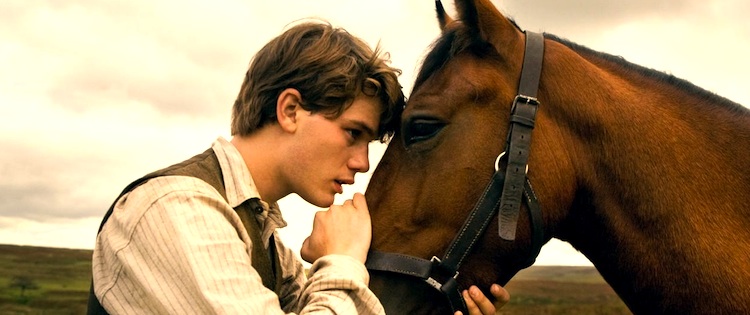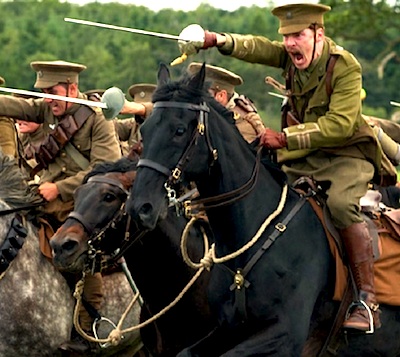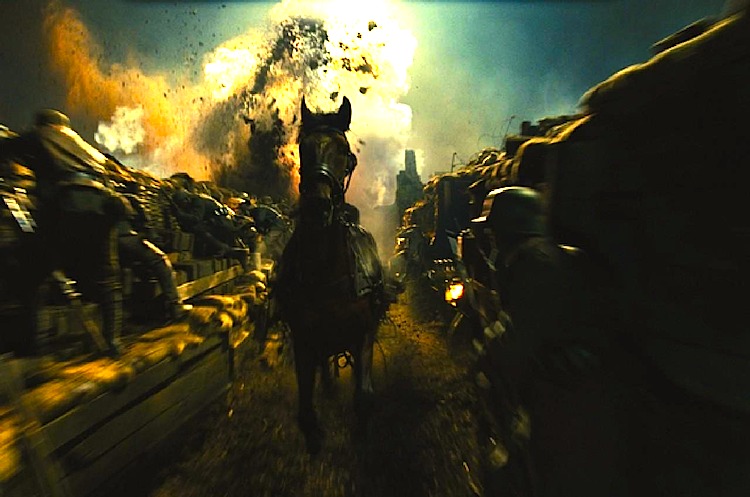By Patricia Ducey. War Horse opens with a rapturous aerial shot of the rolling Devon hills, dotted with neat farms and hedgerows and so achingly verdant that it takes one’s breath away. Soon that transcendent vision of the land as another Eden or demi-paradise gives way to the more intimate image of a mare giving birth in a meadow below, while young Albert Narricott (Jeremy Irvine) watches spellbound from just outside the fence. As the satin-coated foal finds his legs and gambols about, we realize that in one short minute we, like Albert, have fallen totally in love with the spirited youngster. And we know, sadly, something Albert doesn’t: that this idyll will soon be smashed to smithereens.
War Horse‘s story is set in England at the moment before World War I breaks out. In one prideful moment, lovable ne’er-do- well tenant farmer Ted Narricott bids against his hated landlord for the now mature horse at auction. His son Albert is thrilled that his father has brought home the object of his years’ affection and names the horse Joey, but mother Rose (Emily Watson) insists that the horse be sold; a horse as fine as this one must be worthless as a working animal. Albert insists he can train the noble half-thoroughbred to pull a plow; in those desperate economic times, they must plow and plant a rocky field to pay the rent on the farm. The horse soon learns his trade and earns his keep, but a storm later destroys the hard won crop. Thus, finally, Albert’s father Ted (Pete Mullan) is forced to sell the horse. War has broken out, and the British Army snaps up the beautiful animal for its officer corps. Albert bids farewell to his beloved horse – and, for the next hour, we see through Joey’s almond-colored eyes his wartime ordeal on the march to the front lines, all the way to the gut wrenching trench warfare and the terrible climax in No Man’s Land.
War Horse was adapted by British writers Lee Hall (Billy Elliott) and Richard Curtis from a young adult novel, and then Tony-winning play, by British author Michael Morpurgo, which told the story of the Great War through the eyes of a horse and the family that owns him and seemingly loses him. Reportedly, Spielberg saw the play and sewed up the movie deal the next day, even though the schedule interfered with his Tin Tin project.

This being a Spielberg film, and a Young Adult offering, sometimes it claws at your heartstrings when a tug would do, and at 146 minutes, is far too long—a few subplots and scenes could be trimmed, to perhaps leave time to explore Albert’s emotional journey as well. The look and sound of the film experience, though, is flawless, thanks in part to Spielberg’s long-time collaborators, cinematographer Janusz Kaminski and production designer Rick Carter, who breathe fire into the director’s storyboards. Their War Horse must be seen as his team’s masterpiece–if 35 mm film is to give way totally to digital, as Kaminski believes, his work here will remain one of its crowning achievements. The magnificent landscapes of Devon, dwarfing its inhabitants, the shimmer of wind through a grove of trees in an eerie pre-battle silence, are but a few of many memorable shots. And special mention must be made of Spielberg’s initial battle scene, when the English mounted battalion charges a German camp. The visual and aural effects are simply spectacular, the sequence a harrowing reminder that men once rode into battle with sabers unleashed, atop steeds at a thundering gallop, straight into an enemy line, and then drew enemy blood in face-to-face combat. And like the classic films he emulates, Spielberg used thousands of extras and hundreds of horses in the battle scenes: no CGI shortcuts here.

The actors acquit themselves well, and Jeremy Irvine as Albert is affecting. The horse, though, is the star here. Joey is played by several horses, mostly by an American horse named Finder, who also played Seabiscuit. I hope there is an Oscar category for Finder and his trainer, because the horse’s ability to communicate with Albert and with an Army stallion he bonds with is enchanting.
Steven Spielberg delivers here a masterful coming-of-age story, in which the hero’s mettle is tested by war and privation in a world where character is all that remains and all that matters after everything else has been taken. So this is not a cynical or post-modern film; some people may even call the PG-13 War Horse sentimental. The hipster in your life might insist his sniffles are sniffs of disdain, but in all of history, from the renderings in Chauvet Cave to the little girls (like me once) who sketched profiles of ponies in her notebook in history class, there has always been something about a human that loves a horse. War Horse rightfully earns top tier status in this genre.
So if you or your young adult plans to see War Horse, get thee to the multiplex. This is a film that must be seen in a proper theater, not in a living room, to appreciate its many gifts.
Posted on January 5th, 2011 at 6:53pm.

Patricia: it’s nice to read a review by somebody who obviously likes their subject and doesn’t feel the need to be ironic or sarcastic about this kind of movie. This has the look of something that could have been made in the ’50s or early ’60s when Hollywood was last making movies big, epic movies with good values. They had The Sound of Music on Turner Classic Movies recently and all i could think was – why can’t anything be this warm and heartfelt any more? Maybe War Horse is a return to that kind of moviemaking, though as you pointed out, they have to also be careful and not go overboard with the sentimentality.
I was surprised at how much I liked it. More than that, I am still sort of awestruck by the visual artistry and can’t find one ounce of snark to hurl Spielberg’s way. 🙂
I loved this movie. It’s not the seminal war movie that Saving Private Ryan(at least the first and third act is.) I do believe it will actually grow in stature as time goes on. Something along the lines of a Shawshank Redemption. I appreciate this movie for it’s old fashion story telling although I agree there’s some things could have been trimmed. Nonetheless it’s worth the price of seeing it in the theater, which is saying a lot.
I totally agree.
Patricia –
I enjoyed the movie very much and appreciate your review. However, I think there was some use of CGI in the film. At the moment the cavalry charge entered the woods with the machine gun nests, there seemed to be something amiss with the image. There is no way a charging soldier on a horse with a sword would pass a machine gunner without swinging his blade. Yet horse after horse went through the woods, each one threading seamlessly between the row of machine guns. I thought at the time it looked suspect. Do you recall the scene, and did you think it was real or CGI?
I remember that scene, but I thought the rider would be trying just to stay alive at that point and make the jump.
Spielberg says he used real animals throughout. You can check his various interviews about the subject.
Thank you for such an honest review. I marvel at how jaded some critics and so-called movie lovers can be when I hear complaints about WAR HORSE being “old fashioned.” It’s an unabashedly lush movie, with a lot of good will towards its audience.
I know what type of movie this was going in. So, the predictable bemoaning of Spielberg’s “manipulative” style falls on deaf ears for me. All movies are manipulative. That’s one of the key tools of drama. To complain about this is as silly as complaining about dessert being too sweet. Some experiences require a bit of indulgence!
I too agree that the film felt a bit long. But, I’m not sure what could be cut without damaging the cumulative affect of the film. It’s a gorgeous piece of film making. I thin one goes to a movie like this expecting to see gorgeous photography of these magnificent animals, all supported by a superb John Williams score.
I thought it was a lovely film, and it was refreshing to see a story told in a classic Hollywood way.
It would be a fitting ending if the horse was eaten by the chronically underfed German troops, as a sop to the one time enemy